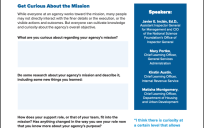Regardless of what point you’re at in your career, keeping your skillset fresh and relevant is an important part of professional development. In today’s competitive job market, no one wants to hire or promote someone who has proficient with floppy disks on their resume; with that in mind, here are some easy ways to keep your skills and knowledge current.
1. Find Local Opportunities
A coding bootcamp might not turn you into the next Paul Allen, but it can give you baseline knowledge of a new and increasingly relevant topic. Many organizations offer workshops or trainings that you can pay to attend, but it is also possible to find free opportunities, through a local library, non-profit, or professional association. Whether you want to become more familiar with Excel or practice new marketing techniques, chances are there are local opportunities for learning.
2. Attend Conferences
Attending a two or three-day conference can give you an in-depth overview of a new skillset and provide an opportunity to build connections that will keep the learning process going. Some may be free to attend, or your organization may be willing to pay for you to go if you can demonstrate that it will contribute to your professional development. If you’re hoping to get funding but are unsure of where to start, there are resources available that can help you put together a proposal to secure training dollars.
3. Learn From Coworkers
Perhaps someone in your office is willing to host trainings, or you could ask to shadow someone while they’re working on a project involving the new skill, application, or software that you want to gain experience with. Be considerate of your coworkers and do your best to return the favor by teaching them skills of your own. If you gather enough interest, you could consider setting up monthly peer-led education sessions, where expertise can be shared across office functionalities.
4. Become an Autodidact
There is a wealth of free resources on the internet for people wanting to learn everything from C++ to basic accounting. Online courses, trainings, and webinars all offer guided instruction, or you can choose to create your own lesson plan. As long as you have enough self-discipline, setting aside some time once or twice a week to work on a skill you’re interested in can be an effective and simple way to develop professionally.
Evolution and adaptation are a necessary and inevitable part of any career, so it makes sense to embrace them wholeheartedly. While learning a new process can be intimidating, it can also be an exciting opportunity to challenge yourself, expand your horizons and build your skillset. By seeking out opportunities to learn and grow, you are making an investment in yourself and your career that will pay itself back many times over.





Love this. My friend, Megan, always says, “If you aren’t learning, you aren’t growing!” Those words are so true.
Great post! There are so many free and paid learning opportunities available. I think the biggest thing is being intentional about taking advantage of the ones that are most relevant to your career goals.